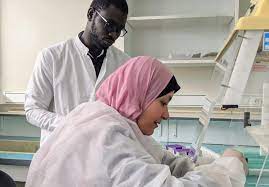
The African Union Health Commission has committed to establishing a response plan and fund as part of the overall strategy to tackle the risk of impending waves of COVID-19 and future pandemics.
The plan was outlined during a meeting last week with the African Union (AU) Champion on COVID-19, President Cyril Ramaphosa.
President Ramaphosa met with the members of the Secretariat and the Leads of the Working Groups of the Commission on Africa’s COVID-19 Response Strategy to discuss progress made by the expert panel.
Having recognised the difficulties that Africa faced in a multilateral context, the experts introduced a bold plan to establish an African Pandemic Preparedness and Response Authority (APPRA) and fund.
According to the Presidency, APPRA aims to secure the region’s capacity to respond to subsequent waves of COVID-19 and future pandemics.
“While the proposed global collaboration on pandemic preparedness was welcomed in principle, the COVID-19 pandemic exposed deep inequalities between wealthy and low- and middle-income countries that were not resolved through multilateralism,” the Presidency said.
President Ramaphosa thanked the panel for the progressive agenda and impactful work done not only to strengthen the continental response to COVID-19 but also to secure future health resilience for the continent.
“I am in full agreement with the tasks that you have set out and that the entities that have already been set up need to be strengthened and interlinked effectively with an African pandemic preparedness authority," said President Ramaphosa.
According to the statement released by the Presidency on Tuesday, the commission has been working to meet its twofold mandate since its inaugural meeting on 22 June 2021.
This includes identifying gaps in the continental COVID-19 response strategy and putting forward evidence-based interventions and to generate evidence to assess its impact on social and economic harm on the continent and proposing ways to a strong recovery.
The experts also determined that the region needed an autonomous, coherent strategy to ensure it can independently protect its people in the event of future outbreaks.
The panel has since committed to supporting the accessibility of new lifesaving therapeutics and intensifying efforts to close the oxygen capacity gap by targeting areas of need.
Meanwhile, regional intelligence gathering and sharing were also highlighted as a key challenge on the continent.
In addition, the commission said it will tackle the interrelated pandemics of gender-based violence and COVID-19 by evidence-based advocacy to reform laws and policies. The commission said the ability of women and girls to exercise autonomy over their bodies is a challenge, particularly during crisis periods.
The panel believes that the pandemic sharply exposed the region’s lack of capacity to produce its stock for crisis response and resolved to respond to the call to establish biotechnological sovereignty for the protection of Africans.
In addition, emphasis has been placed on future health security by building on the achievements of President Ramaphosa’s chairship and the current championship on COVID-19.
The President expressed his support and readiness to champion the work of the expert panel, and to table the interventions at the AU mid-year coordinating meeting.
Ten key strategic areas where the panel will intervene:
1. Lobby for a treaty towards the APPRA and the establishment of a supporting fund.
2. Facilitate meaningful African representation on the proposed collaboration towards a global pandemic preparedness treaty.
3. Recognition of and full endorsement of the Partnership on Vaccine Manufacturing (PAVM) established under the AU through the Africa Centres for Disease Control and Prevention (Africa CDC).
4. Enhanced surveillance and antigen testing by deploying up to 200 million rapid diagnostic tests in the next six months.
5. Establishment of a central information open-source platform for threat analysis and response.
6. Establishment of a National Public Health Institution in every Member State.
7. Equitable access of all lifesaving COVID-19 tools through implementation studies of monoclonal antibodies and new therapeutics.
8. Position the region as an attractive health investment destination and mobilise governments to buy African biotech.
9. The establishment of a high-level accountability panel or council.
10. Evidence-based development of a framework for action to combat the escalation of violence against women and girls, and to recover sexual and reproductive health services. – SAnews.gov.za


